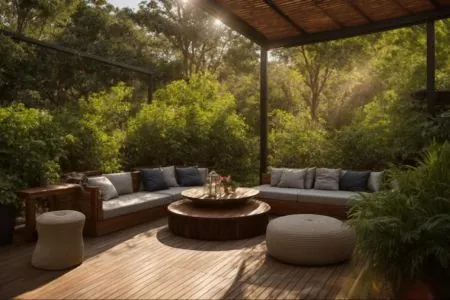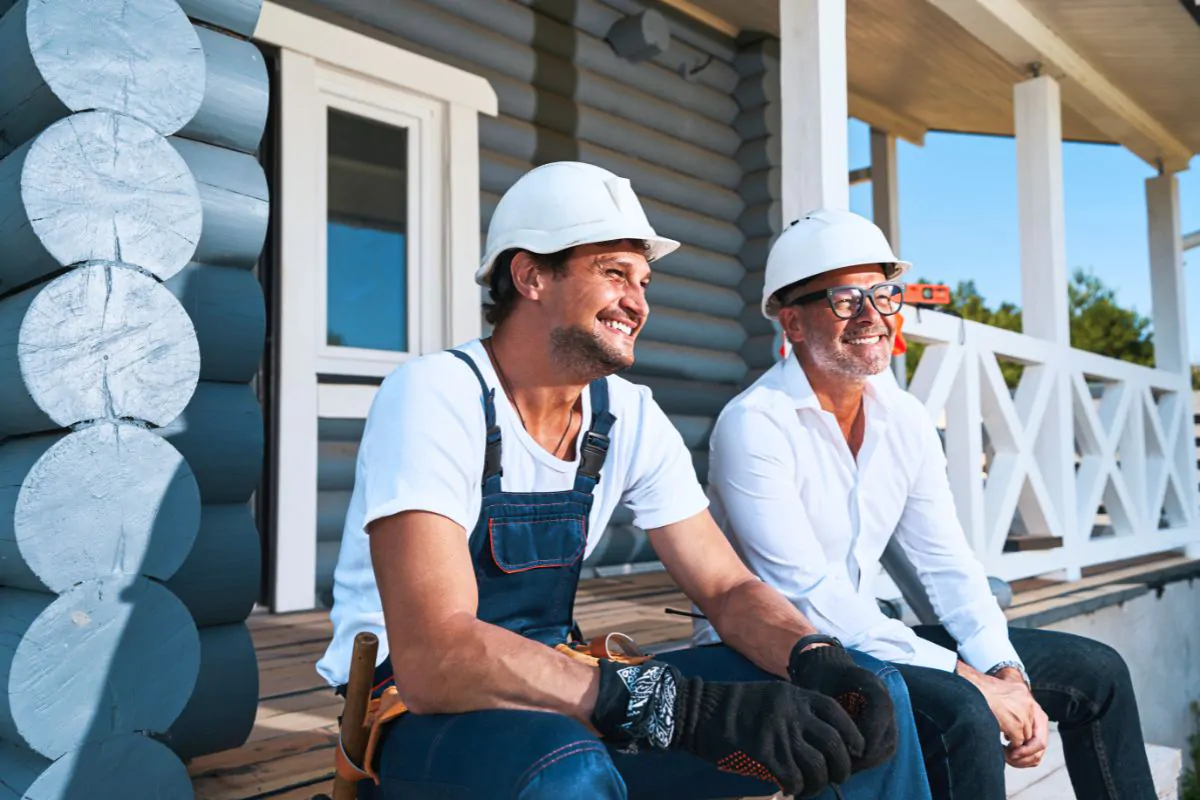Selecting the suitable material for your swimming pool deck is crucial for creating a safe and inviting outdoor space. With numerous options available, it is essential to consider factors like water resistance, heat absorption, and durability. The small details often make a huge impact on your pool deck’s short—and long-term look, appeal, and durability. Each material brings unique advantages and challenges, impacting your pool area’s functionality and aesthetics. Understanding these nuances is a key part of finding the best material for your decking setup!
Whether you are drawn to wood’s natural beauty, composite materials’ durability, or stone’s elegance, understanding these elements will help guide your decision. A well-chosen deck not only enhances your poolside experience but also stands up to the elements, ensuring long-lasting enjoyment for years to come.
Essential Key Takeaways for Choosing Swimming Pool Deck MaterialsKey Takeaways
When selecting materials for your swimming pool deck, consider stamped concrete for its durability and design flexibility. This option allows for a customizable look while effectively handling constant exposure to water. Proper waterproofing is essential to prevent water damage and ensure the deck’s longevity. Waterproof material protects the underlying structure and helps maintain its appearance over time; it can be applied to various materials to improve look and durability.
Concrete is favored for its strength and low maintenance, making it ideal for wet conditions and heavy foot traffic. Additionally, balancing quality and cost is crucial; this ensures you achieve a satisfactory outcome without exceeding your budget. Considering these factors will lead to a beautiful and durable pool deck that enhances your outdoor space. Planning ahead of time will ensure you choose the right material for your swimming pool deck.
Key Factors to Consider When Choosing Deck Materials
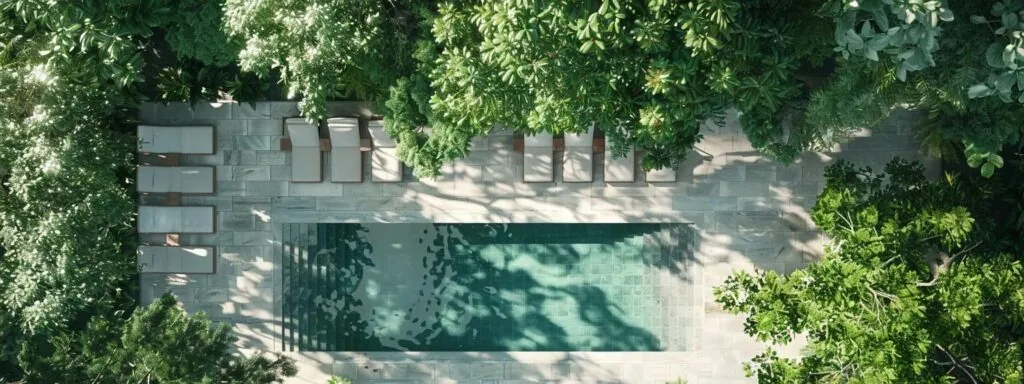
Durability and water resistance are key factors when determining the best material for your swimming pool deck. Consulting with above-ground pool deck builders can further guide your decision.
Durability and Resistance to Water
When selecting the best material for the swimming pool deck, travertine stands out for its durability and low water absorption. It maintains its color well under pool water and sunlight, making it both practical and attractive. Porcelain tile is another excellent choice, known for its low water absorption and resistance to wear. Unlike limestone or slate, porcelain requires minimal maintenance, offering pool owners a long-lasting, resilient surface for their outdoor space.
Safety and Slip Resistance
Safety is a top priority when choosing swimming pool deck materials. Slip-resistant options, such as specific plastic composites and textured porcelain tiles, can significantly reduce the risk of accidents. These materials also resist mold and mildew, creating a safer poolside environment. Selecting surfaces that deter moss buildup further enhances the safety and usability of decking around the pool for families and friends to enjoy.
Aesthetic Appeal
The aesthetic quality of your pool deck significantly impacts the overall outdoor space. Stencil patterns on concrete can mimic the appearance of more expensive materials while maintaining durability. Ceramic tiles provide a high-end look and are resistant to pool chemicals, creating a visually appealing area that complements your landscape. Choosing the right design can enhance your outdoor ambiance and increase the enjoyment of your pool area.
Maintenance Requirements
Maintenance needs can vary widely among swimming pool deck materials. For instance, flagstone requires periodic sealing and joint care to prevent weed growth. Colored concrete may need sealant reapplied regularly to maintain its vibrancy and protect against wear. Understanding the maintenance requirements of different materials can help keep your pool area looking its best while minimizing the effort and time spent on upkeep.
Must Read: How Much Should I Plan to Spend on a Deck Around an Above-Ground Pool?
Budget Considerations
When evaluating pool decking options, costs can vary significantly. Granite offers a luxurious finish but comes at a higher price than materials like wood, which provides a natural look but may require regular maintenance. Balancing quality with budget is essential; making informed material choices can result in a beautiful, lasting deck without overspending. Consulting with above-ground pool deck builders offers insights into personalized and cost-effective solutions.
The Best Materials for an Above Ground Pool Deck
Selecting the right material for an above-ground pool deck requires balancing durability against challenges like algae and water while also ensuring it complements the overall aesthetic of your garden. Consider maintenance needs, safety, and style.
Wood Decking: A Classic, Natural Look
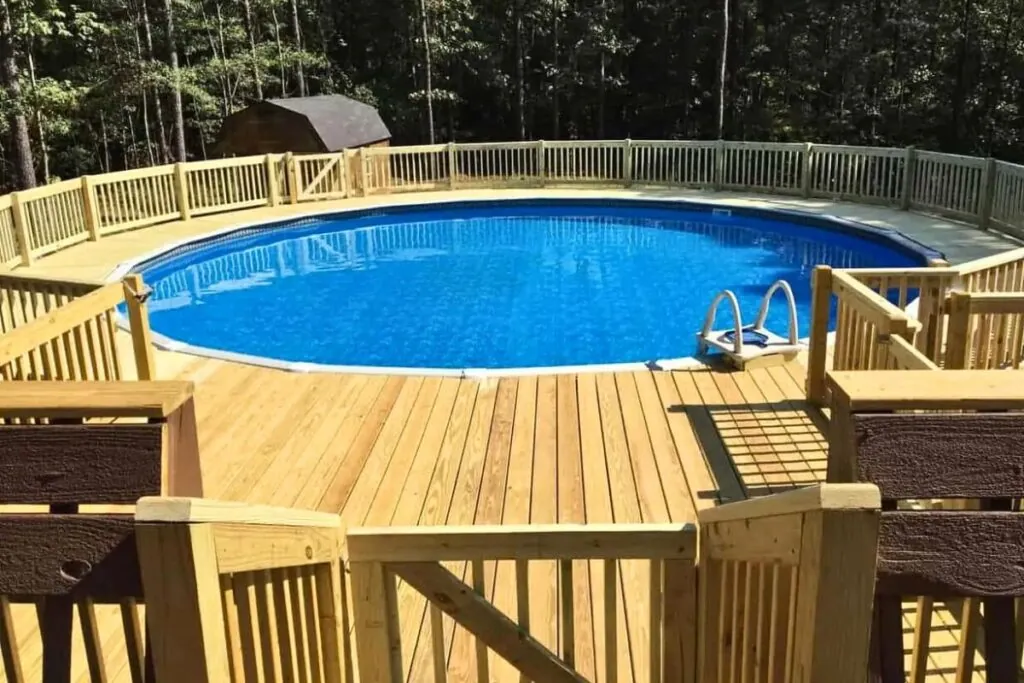
Wood decking provides a timeless and natural aesthetic for above-ground pools. Teak is an excellent choice due to its water resistance and durability, helping create a welcoming space. Its natural oils protect against moisture, especially when combined with an effective drainage design. Consider incorporating cobblestone accents around a sandstone or terracotta tile deck to enhance the overall look. While cobblestone isn’t commonly used for decking, it can add visual charm to your pool area while remaining practical and functional.
Composite Decking: Low-Maintenance and Durable
Composite decking is an excellent choice for above-ground pool renovations, standing out as the best material for swimming pool decks. It combines durability with low maintenance, avoiding issues like warping and rotting common in traditional wood. Made from wood fibers and recycled plastic, composite decking withstands moisture and heavy foot traffic. It accommodates various designs, allowing pool owners to achieve a stylish and resilient surface without constant upkeep, making it ideal for any poolside setting.
PVC Decking: Ultimate Resistance to Water
PVC decking is among the best pool deck materials for its exceptional water resistance and durability. It withstands splashes and harsh weather, making it a preferred choice for above-ground pool deck builders. In addition to its functionality, PVC offers a variety of colors and textures, allowing homeowners to customize their outdoor decor. For those seeking a modern and low-maintenance solution, PVC decking not only excels in moisture resistance but also enhances the overall look of the pool area.
Concrete: Customizable and Cost-Effective
Concrete is a practical and cost-effective option for above-ground pool decks, providing extensive customization possibilities. It can feature simple finishes or decorative stamped patterns that mimic natural stone, allowing it to adapt to various styles. With minimal maintenance, concrete remains visually appealing and durable. Its resilience makes it ideal for pool areas, offering a solid foundation that withstands the elements while maintaining its appearance over time. This versatility ensures your deck can be functional and attractive for many years.
Stone Pavers: A Luxurious and Durable Choice
Stone pavers combine elegance and durability, making them an excellent option for above-ground pool decks. Their natural texture and variety of colors and shapes offer a customized look. Stone pavers are attractive and slip-resistant, enhancing safety around the pool for family members or friends of all ages. They remain cool even in the sun, creating a comfortable environment for family and guests. This combination of luxury and practicality makes stone pavers a top choice for poolside settings and pool deck material consideration.
Similar Post: Choosing the Best: Deck Footing Options Explored
Choosing the Best Material for Your Swimming Pool Deck
Selecting the right materials for your swimming pool deck is vital for achieving the right balance of functionality, safety, and aesthetics. Concrete is a popular option due to its affordability and versatility, allowing for various designs.
PVC and composite decking stand out for their exceptional water resistance and low maintenance needs, making them ideal for busy pool areas. Additionally, stone pavers enhance safety with their natural slip resistance, providing peace of mind for families.
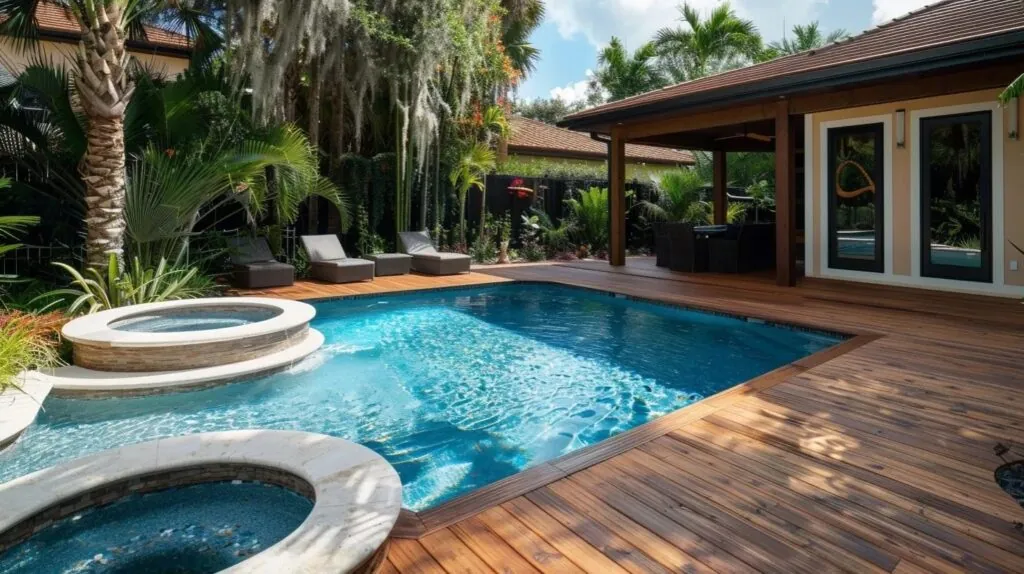
Each material significantly affects the overall look of your outdoor space and influences ongoing upkeep. By carefully evaluating immediate needs alongside long-term durability, you can create a pool area that is not only visually appealing but also enjoyable and secure for years of relaxation and entertainment. Do not put off your new pool deck installation project any longer. Call Ludlow Deck Builders and get the decking setup of our dreams, and rest assured your deck will stand up to years of enjoyment and use with the right material selection!
Frequently Ask Questions
1. What is the best material for an in-ground pool deck?
Concrete and natural stone are top choices for pool decks. Concrete is affordable, durable, slip-resistant, and easy to maintain. It also offers design flexibility with various colors and textures. Natural stone, like travertine or slate, provides a luxurious look, remains cool in heat, and is highly durable. While stone may require more upkeep, both materials create a long-lasting, stylish pool deck.
2. What is the longest-lasting pool deck material?
Concrete and natural stone are among the longest-lasting materials for pool decks. Concrete withstands weather, heavy use, and pool chemicals, lasting decades with proper sealing. Natural stones like travertine or limestone offer a sophisticated look and resist fading, scratches, and stains, withstanding years of use with minimal maintenance.
3. What pool deck surfaces don’t get hot?
Travertine and composite decking stay cool even in intense sun. Travertine, a natural stone, doesn’t absorb heat, making it comfortable for bare feet. Composite decking, made from wood fibers and recycled plastics, resists heat absorption and provides a stylish, durable option.
4. What is the best deck color for a pool?
Neutral colors like beige or light gray are popular for pool decks, blending with the landscape and water. Light blue or aqua create a cohesive look with the pool, while darker shades like charcoal add contrast but may get hot. Choose a color that suits your style, landscape, and practical needs.
5. Is it better to stain or paint a pool deck?
Staining highlights the deck’s natural look with a translucent finish and requires less upkeep. Painting offers a uniform color and UV protection but may need reapplication. Choose based on your style, budget, and maintenance preferences.
6. What is the lowest-maintenance pool decking?
Concrete, composite decking, and natural stone require minimal maintenance. Concrete can be customized and only needs occasional sealing. Composite decking resists rot and fading, needing just soap and water to clean. Natural stones like travertine add a high-end look and require occasional sealing for durability. Each option is durable and simple to maintain.

